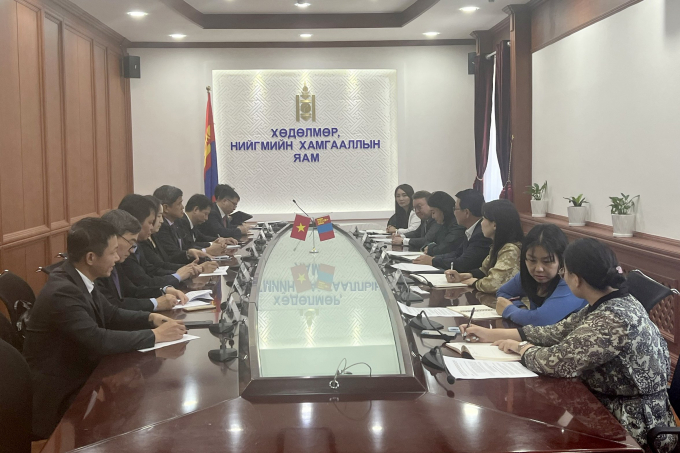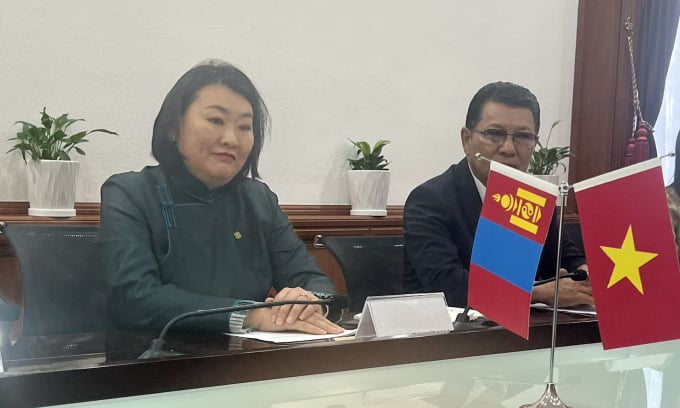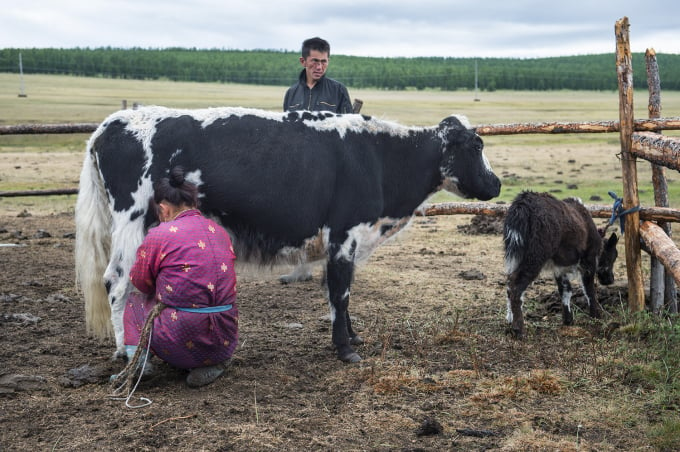June 16, 2025 | 01:29 GMT +7
June 16, 2025 | 01:29 GMT +7
Hotline: 0913.378.918
June 16, 2025 | 01:29 GMT +7
Hotline: 0913.378.918

Overview of the working session on June 23 between the Ministry of Agriculture and Rural Development of Vietnam and the Ministry of Labor and Social Protection of Mongolia. Photo: Dang Quang Huy.
The Ministry of Agriculture and Rural Development led by Deputy Minister Tran Thanh Nam had a working session with the Ministry of Labor and Social Protection of Mongolia on the morning of June 23. At this meeting, the leaders of the Ministry of Agriculture and Rural Development emphasized the goal of raising the bilateral trade turnover between the two countries to 100 million USD - which was addressed at the 17th session of the Vietnam - Mongolia Intergovernmental Committee.
"Our countries have potential and advantages to promote cooperation in the fields of agriculture, digital transformation, energy and so on. We would also like to learn more about the potentials and opportunities for cooperation between the two countries", said Deputy Minister Tran Thanh Nam.
As a "forerunner" for the delegation of the Minister of Agriculture and Rural Development Le Minh Hoan, scheduled to visit Mongolia and attend the 18th session of the Vietnam - Mongolia Intergovernmental Committee on August 8, Deputy Minister Tran Thanh Nam proposed that the two countries will advise and recommend their corresponding governments to enhance cooperation in four areas.
Firstly, tourism will be promoted to a pioneering position to stimulate and promote other fields. According to Deputy Minister Nam, both countries have strengths to promote tourism: Vietnam has a long coastline, majestic mountains, beautiful landscapes that have been honored as cultural heritages and world wonders; Mongolia has a vast steppe and a unique cultural life.
Air transport will be the second focus. Direct flights have been organized since March 2022 resulting in the steadily increasing number of registered tourists.
Thirdly, Mongolia will create favorable conditions for the Vietnamese labor community in their country; additionally, the country will continue to implement the Memorandum of Understanding between the Ministry of Labor, War Invalids and Social Affairs of Vietnam and the Ministry of Labor and Social Protection of Mongolia.
Fourthly, agricultural products trade will also be increased. Namely, rice-growing and goat-raising projects will be the main focus; the market for frozen meat products from Mongolia to Vietnam and vegetable and seafood products from Vietnam to Mongolia will also be opened.

Ms. Ariunzaya, Mongolian Minister of Labor and Social Protection. Photo: Dang Quang Huy.
Minister of Labor and Social Protection of Mongolia, Ms. Ariunzaya commended the attention from the Vietnamese side, especially in the business sector, when a forum was successfully organized on June 22. She also acknowledged that the 17th session of the Vietnam - Mongolia Intergovernmental Committee had proposed multiple contents without proper implementation due to the impact of Covid-19.
According to the Minister, Mongolia currently slaughters nearly 20 million cattle annually. However, the organization of production is still limited because the main rearing method is free grazing. This country currently owns 30 million sheep, 30 million goats, 4 million cows, 4 million horses, and 2 million camels approximately.
"We request that Vietnam facilitate and expand the market further so that products such as frozen cattle meat from Mongolia can access the market of 100 million people", Ms. Ariunzaya said.
At 80 million USD, the two-way export turnover between Mongolia and Vietnam only accounts for 0.5% of the country's total import and export turnover. Ms. Ariunzaya proposed some measures in order to promote cooperation including joint production between businesses of the two countries.
Additionally, the Mongolian Minister of Labor and Social Protection called on Vietnam to study and invest in the country's tanning technology.
"We want to learn about Vietnam's development policy for some handicrafts products, as well as cooperate on the exchange of human resources", emphasized Ms. Ariunzaya.

Mongolia has a large number of cattle but the rearing is not concentrated because of its sparse population density, at 2 people per square kilometer.
At the end of the meeting, Deputy Minister Tran Thanh Nam agreed on a number of points put forward by the Mongolian side. This includes completing the legal basis (MOU, cooperation agreement) between the two countries; strengthen the exchange of labor resources, including vocational training for people with disabilities; allocate resources for the development of trade by rail through China.
The Minister of Agriculture and Rural Development promised to provide information for Mongolia and discuss further in the fields of investment, science and technology, and agriculture. He also agreed to promote the establishment of the Vietnam - Mongolia Business Association so that businesses from both countries can have a platform to exchange experience and learn from one another.
"We are very grateful that Mongolia has created favorable conditions for the community of 500 Vietnamese labors working in its country. Vietnam can provide additional high-quality labor resources, including those in the livestock sector, so that the two countries can have an opportunity to transfer technical advances", expressed Deputy Minister Nam.
On June 23, the delegation of the Ministry of Agriculture and Rural Development is expected to visit livestock and slaughter facilities in Mongolia. On June 24, the delegation will work with the Ministry of Food, Agriculture and Light Industry of Mongolia, as well as greet the Mongolian Foreign Minister, Ms. Batsetseg.
On the same day, the leaders of the Ministry of Agriculture and Rural Development also worked with the Vietnam - Mongolia Diplomatic Association, before returning to Hanoi on the morning of June 26.
Translated by Nguyen Hai Long

(VAN) The working delegation from the Ministry of Agriculture and Environment conducted an important trip to the Netherlands to strengthen strategic partnerships and sustainable development in the agricultural sector.

(VAN) The letter ‘A Plea from the Ocean’ not only evokes emotion but also awakens the human conscience to the responsibility of protecting life on Earth.

(VAN) The Department of Agriculture in South Africa has announced the country’s first mass vaccination of poultry to prevent local birds from contracting avian influenza.

(VAN) Establishment of the Mekong Delta Regional Agricultural Linkage Center, aiming for a closed value chain, deep processing, trading platforms, and international market connectivity.

(VAN) Gia Lai province has recently recorded 460 rare species of animals and plants, contributing to forest conservation and biodiversity planning in the region.

(VAN) Ms. Caroline Beresford, New Zealand Ambassador to Vietnam, expressed confidence that agricultural cooperation between Vietnam and New Zealand will develop sustainably, be climate-resilient, and promote gender equality.

(VAN) Vietnam reaffirms its commitment to international cooperation in fostering sustainable and responsible fisheries while ensuring resilient livelihoods for small-scale fishing communities.